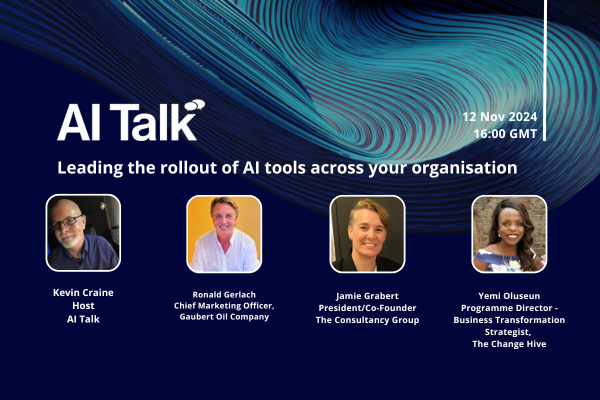Pioneering AI in the digital age

Alex Galbraith at SoftwareOne shares key takeaways from the London AI Summit
Artificial Intelligence (AI) represents a transformative force with the potential to revolutionise society, from healthcare and education to finance and entertainment. By automating complex tasks, enhancing decision-making processes, and enabling new levels of personalisation and efficiency, AI stands at the forefront of technological advancement.
Recognising this potential, SoftwareOne attended the annual AI Summit at Tobacco Dock in London earlier this summer, to explore practical and profitable AI implementations. Here are our top five takeaways to help guide organisations on their AI adoption journey.
1 The human-machine balance
One of the most significant Summit themes was addressing ongoing concerns about the delicate balance between humans and AI systems and the impact this will have on employment.
Colin Jarvis, Distinguished Architect at OpenAI, highlighted that the degree of human intervention versus automation will likely vary considerably across different industries. For example, the legal sector, with its complex and nuanced nature, might rely more on AI trawling thousands of documents, but it would not blindly use this data without a human to evaluate and refine the output.
Compare this to other industries where simpler, more repetitive tasks and decisions can be efficiently automated with minimal (but never zero!) oversight.
Finding this balance is crucial. It’s about harnessing the best of both worlds—leveraging AI to handle mundane tasks while retaining human oversight for more complex decision-making processes. This approach enhances efficiency and ensures that their users trust and accept AI systems, providing smoother integration and wider adoption.
A corresponding challenge is finding humans with the skills required to implement AI in the first place—an issue SoftwareOne recently explored in its Cloud Skills Report.
2 Building trust and ensuring safety
AI is changing the world, fast. Indeed, some have called Generative AI ‘an iPhone moment’. The summit underscored the critical importance of every organisation defining and adhering to responsible AI principles and addressing the ethical and safety risks inherent with rapid AI adoption.
This is why companies like Google and Mastercard have published comprehensive guidelines for their teams to help ensure AI technologies are developed and utilised ethically and responsibly within their businesses. These include tenets such as avoiding unfair bias, ensuring safety, and upholding privacy standards.
The Summit also shed light on some of the specific ethical and safety risks associated with AI. From data bias to privacy concerns and the potential weaponisation of AI technologies, these risks are broad and tackling them will require a collaborative human approach. Establishing robust guardrails, conducting thorough testing, and fostering a culture of continuous monitoring and improvement are essential to mitigating them.
3 Governance: managing AI development and use
Effective governance of AI models involves overseeing their behaviour, ensuring they stay on topic, and addressing the challenges that might be encountered when the models interact with customers at scale. Striking the right balance between model autonomy and responsible supervision remains an ongoing endeavour and one which is increasingly likely to take place within a regulatory framework.
For example, the Artificial Intelligence Act is now in effect within the European Union. In addition to existing regulations such as GDPR, this groundbreaking legislation adopts a risk-based approach and demonstrates that some jurisdictions are now showing real teeth in their approach to AI adoption. Organisations will need to adapt their strategies in response.
4 Culture: fostering positive attitudes towards AI
AI adoption doesn’t happen in a vacuum.
Organisations that foster a start-up mentality and prioritise experimentation will tend to have more successful AI integrations. A culture that is driven by data, where decisions are backed by analytical insights, ensures that strategic choices are evidence-based.
Moreover, adopting a ’fail fast and learn’ approach is crucial. Viewing failure as a stepping stone rather than a setback fosters a culture of experimentation and swift adaptations and could prove vital for keeping up with the rapid advancements in technology.
Naturally, that positive and progressive culture also needs guardrails to maintain acceptable standards of ethical and responsible AI use, as well as technical testing and controls to mitigate the risk of negative brand impact from misuse of AI tooling on publicly accessible systems.
5 Multi-modal interfaces are the future of interaction
A final insight from the Summit was the clear and growing prominence of multi-modal interfaces in AI.
The ongoing cycle of smarter, faster and cheaper AI models has enabled interfaces that integrate various forms of input and output, including audio, video, text, and images, creating a more seamless and efficient user experience.
The ability to handle multiple modalities through single API calls to AI systems is also reducing the latency of applications and interactions, enhancing overall performance. ChatGPT 4o is a prime example of this, mixing textual and voice inputs and outputs in near real time.
Imagine ever more sophisticated assistants capable of understanding and responding to voice queries, analysing images or video for context, and providing textual summaries - all within a single interaction. This level of sophistication not only improves user engagement but also broadens the applicability of AI across diverse sectors, from healthcare to customer service and beyond.
These capabilities will continue to improve rapidly, and will significantly disrupt various industries, which have already seen machine learning provide an explosion in personalisation over the past decade.
This raises the question of which other industries will see a similar impact.
Themes such as balancing human oversight and automation, ensuring safety, effective governance, organisational culture, and embracing multi-modal interfaces were highlighted at the AI Summit.
As AI continues to evolve, these takeaways will help guide organisations in their strategic AI adoption. It’s crucial for organisations to adopt AI strategically and thoughtfully avoiding the hype to ensure it benefits all sectors of society.
Alex Galbraith is CTO Cloud Services at SoftwareOne
Main image courtesy of iStockPhoto.com and gorodenkoff

Business Reporter Team
Most Viewed
Winston House, 3rd Floor, Units 306-309, 2-4 Dollis Park, London, N3 1HF
23-29 Hendon Lane, London, N3 1RT
020 8349 4363
© 2024, Lyonsdown Limited. Business Reporter® is a registered trademark of Lyonsdown Ltd. VAT registration number: 830519543





